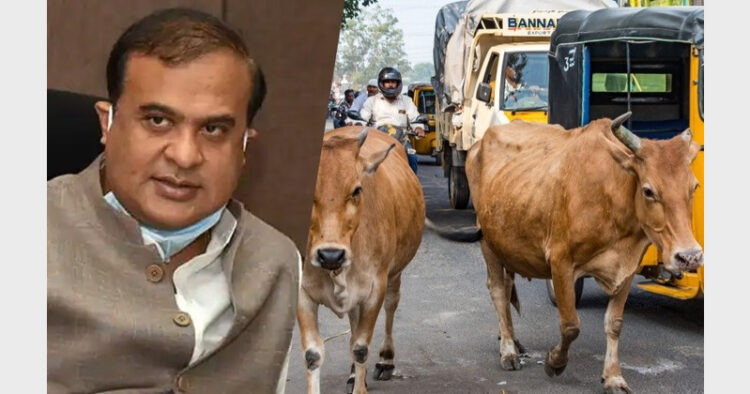Nipon Kumar Saikia
Assam’s new Cattle Bill creates unrest among a section of the perpetually miffed media.
Assam cabinet approved a proposed Cattle Preservation Bill 2021 on July 8, which Chief Minister Dr. Himanta Biswa Sarma tabled on the first day of this budget session. This shows the government’s commitment in addressing the concerns caused by audacious smuggling and illegal trading of cattle in the state, which was also a popular public demand during the election campaign. The usual suspects did not even terry a little before declaring it divisive and stoking social fault lines. The July 15 editorial of the IE termed it a bad idea.
How can it be a bad idea to preserve a species that nourishes nature so much? Is it a bad idea to protect trees and forests? Is it a bad idea to preserve natural sources of water bodies? Then how does it become a bad idea to bring in legislation to preserve a species which is a major sheet anchor in the delicate tapestry of Mother Nature? And notwithstanding the doomsday dealers’ warnings, the proposed bill has the potential to harmonize communities weary of hash-tag trending monstrosity of insensitive humanoids, sinking their venomous teeth into cattle carcasses, indulging in decadent street theatrics.
Also, it is a dead idea to say that cattle should be protected only so far as it is useful as a milch animal, or for plowing. Even after a cow stops giving milk or a bull can not suffer the yoke anymore, which is less and less needed these days, these benign gentle creatures remain the most selfless friend of the farmer’s fields. They continually pump life into the land by nourishing beneficial microbes in their excreta when they are alive and in their rotting bodies when they are dead. As the world is emphasizing more and more organic farming, this is the most cost-effective measure a society can take: preserve their cattle. No, Mr. Editor, Chief Minister Himanta Biswa Sarma does not want to be the poster boy of Hindutva. He has a mission to accomplish — to make Assam the organic hub of the nation. And Assam shall gladly supply organic produce to all the media houses at a discounted price.
The editorial states that the North East is home to vast beef-consuming communities with a condescending attitude and callousness, which is insulting. The majority of cattle trafficked via Assam are smuggled into Bangladeshi markets.
While many communities in the North East eat beef, this in no way means that beef is their staple food. Among most tribes where beef is not taboo, it is mostly consumed only during festivals as additional comfort food. Contrary to the warped imagination of the champagne-sipping, air-conditioned intellectuals, tribal people in the North East survive on a very healthy diet comprising rice, roots, and various herbs — very delicious, very healthy, very natural — of the kind, a dietician would recommend curing those intellectuals of their accumulated lifestyle diseases. More than beef, it is pork a common North Easterner would swear by. And there is no restriction on pork.
Hill tribes of the North-East are very health conscious and, they know that heavy intake of red meat would adversely affect their health. If the Northeastern states are such hard-core beef consumers (as mentioned in the editorial), then isn't it their responsibility to produce it? Considering that we have made such enormous advances in agricultural biotechnology, they can adopt new techniques to even produce beef, can’t they?
By saying the beef prices will spike up after this Bill is passed in the Assam assembly, is the writer indirectly supporting the beef intake from smuggled cows since it comes cheap? As opposed to the views of these Beef-Biryani Bolsheviks, the agrarian proletariats are not getting profit from illegal cattle trade–the bourgeoisie smugglers come in their modified SUVs, steal their cattle, bribe the police and politicians, satiate the salivating liberals with Beef-Biryani, stuff their coffers, and contest elections. The proposed Bill empowers the farmers who can now decide what to do with their Lakhimis and Futukis and Pakharas.
And it’s a huge wonder why do these Thunbergers don’t talk about the huge carbon footprint left in the environment by the production, consumption, and export of red meat? After all, a consciousness movement is growing against commercial red meat production in the West, which they emulate.
In a country where all airlines and major hotel chains offer only halal meat to satisfy the religious sentiments of the minority, is it not a good idea to be respectful to the religious beliefs of Hindus, Jains, etc? At least try to be generous, even if you can not stop fantasizing about savoring a juicy beefsteak. After all, have they not played waterless Holi to conserve water and celebrated crackerless Diwali to not frighten your foreign-breed canines? Is it not a good idea to be a little accommodating, sir?
(The writer is Guwahati-based columnist)













Comments